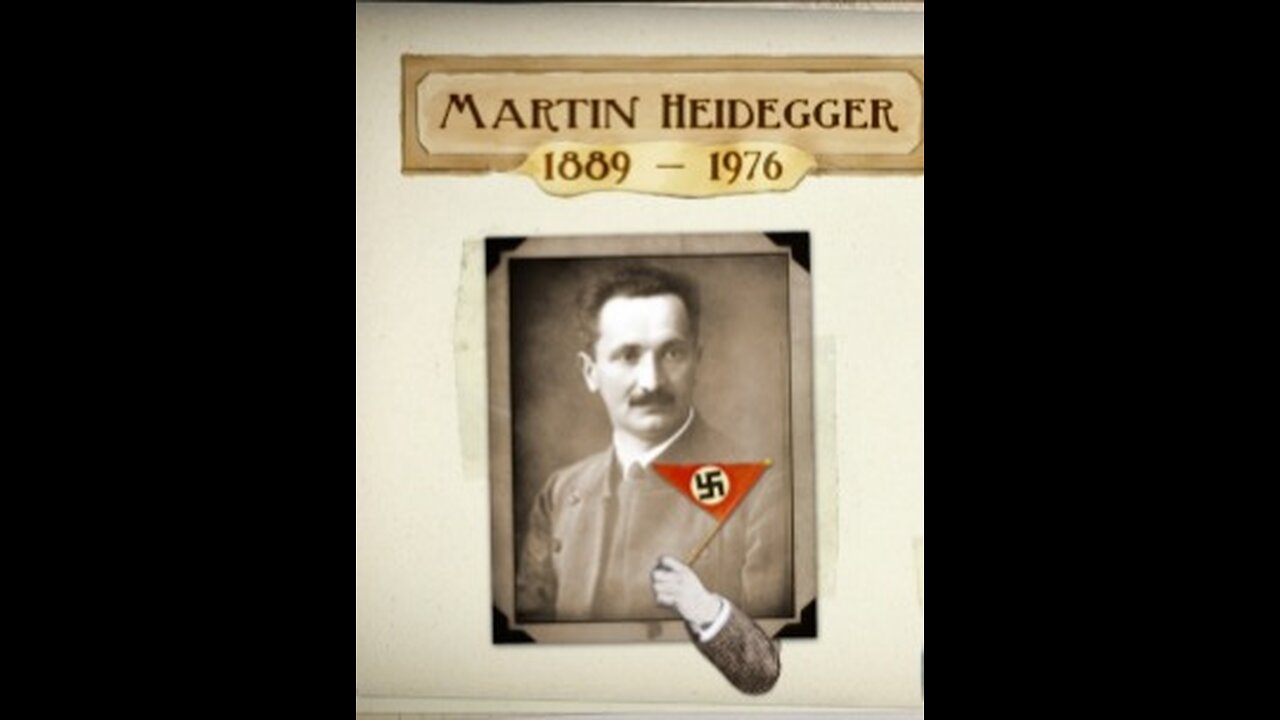Premium Only Content

Carl Gustav Jung ⚔️ Martin Heidegger
Heidegger in 90 Minutes - Paul Strathern - Read by Jonathan Keeble
Paul Strathern (born 1940) is a British writer and academic. He was born in London, and studied at Trinity College, Dublin, after which he served in the Merchant Navy over a period of two years. He then lived on a Greek island. In 1966 he travelled overland to India and the Himalayas. His novel A Season in Abyssinia won a Somerset Maugham Award in 1972.
Besides five novels, he has also written numerous books on science, philosophy, history, literature, medicine and economics.
Heidegger's modus philosophandi is neurotic through and through and is ultimately rooted in his psychic crankiness
To Arnold Kiinzli
Dear Herr Kiinzli, Einsiedeln, 28 February 1943
Your kind letter has reached me in the dark forest where I am snatching the air for a few days.
I have nothing against your views if critical analysis, as you want it to do, not only judges by the presuppositions of the past but also takes account of the facts which the present has brought to light.
Philosophical criticism must, to my way of thinking, start with a maximum of factual knowledge if it is not to remain hanging in midair and thus be condemned to sterility.
I can put up with any amount of criticism so long as it is based on facts or real knowledge.
But what I have experienced in the way of philosophical criticism of my concept of the collective unconscious, for instance, was characterized by lamentable ignorance on the one hand and intellectual prejudice on the other.
Brinkmann's book on the unconscious is an exception. A work like this-and here I entirely agree with you-is a most welcome clarification of concepts and hence a valuable stepping-stone to the future.
I have no objection whatever to objective studies of this kind, since they meet all the requirements of the scientific attitude.
They discard unconscious subjective prejudices, whereas Heidegger bristles with them, trying in vain to hide behind a blown-up language.
Here he shows his true colours.
Only listen to one seminar on psychiatry and then you will know where this language can also be heard.
At Brinkmann's lecture in the SGPP the contrast between his normal language and the twaddle he read out from Heidegger was positively comic.
This struck not only me but my psychiatric colleagues as well.
The substance of what he read out was unutterably trashy and banal, and Brinkmann could just as well have done it to make Heidegger ridiculous.
At any rate that is the effect it had.
Heidegger's modus philosophandi is neurotic through and through and is ultimately rooted in his psychic crankiness.
His kindred spirits, close or distant, are sitting in lunatic asylums, some as patients and some as psychiatrists on a philosophical rampage.
For all its mistakes the nineteenth century deserves better than to have Heidegger counted as its ultimate representative.
Moreover this whole intellectual perversion is a German national institution.
England can oblige only with James Joyce and France with surrealism.
Italy remains tame with her Benedetto Croce, who should actually be dated 1850.
For all its critical analysis philosophy has not yet managed to root out its psychopaths.
What do we have psychiatric diagnosis for?
That grizzler Kierkegaard also belongs in this galere.
Philosophy has still to learn that it is made by human beings and depends to an alarming degree on their psychic constitution.
In the critical philosophy of the future there will be a chapter on "The Psychopathology of Philosophy."
Hegel is fit to bust with presumption and vanity, Nietzsche drips with outraged sexuality, and so on.
There is no thinking qua thinking, at times it is a pisspot of unconscious devils, just like any other function that lays claim to hegemony.
Often what is thought is less important than who thinks it.
But this is assiduously overlooked.
Neurosis addles the brains of every philosopher because he is at odds with himself.
His philosophy is then nothing but a systemized struggle with his own uncertainty.
Excuse these blasphemies!
They flow from my hygienic propensities, because I hate to see so many young minds infected by Heidegger.
Best regards,
Yours sincerely,
C.G. Jung ~Carl Jung, Letters Vol. 1, Pages 330-332.
-
 6:25:28
6:25:28
vivafrei
11 hours agoD.C. Gulag Jan. 6 Prisoners Release Watch!
221K108 -
 1:49:14
1:49:14
Redacted News
11 hours agoTrump is Back! Congress Uncovers New Biden Crimes One Day After He Leaves D.C. | Redacted
192K250 -
 2:09:53
2:09:53
Benny Johnson
11 hours ago🚨President Trump LIVE Right Now Making MASSIVE Announcement At White House News Conference
300K430 -
 2:04:10
2:04:10
Revenge of the Cis
11 hours agoEpisode 1433: Retribution
131K21 -
 1:42:50
1:42:50
The Criminal Connection Podcast
15 hours ago $1.26 earnedEddie Hearn talks JOSHUA vs FURY, Working With Frank Warren & The Truth About Turki Alalshikh!
65.9K2 -
 1:00:25
1:00:25
In The Litter Box w/ Jewels & Catturd
1 day agoGolden Age | In the Litter Box w/ Jewels & Catturd – Ep. 724 – 1/21/2025
154K83 -
 57:42
57:42
The Dan Bongino Show
18 hours agoHE'S BACK! (Ep. 2405) - 01/21/2025
1.45M2.63K -
 46:19
46:19
Candace Show Podcast
12 hours agoUH-OH! Elon’s Viral Salute Steals The Inauguration Show | Candace Ep 136
168K457 -
 8:05:01
8:05:01
hambinooo
16 hours agoNO COMMIE TUESDAY
102K3 -
 2:08:37
2:08:37
The Quartering
14 hours agoTrump Ends Online Censorship, Foreign Aid, Frees J6 Hostages & Much More In Day 1
141K58